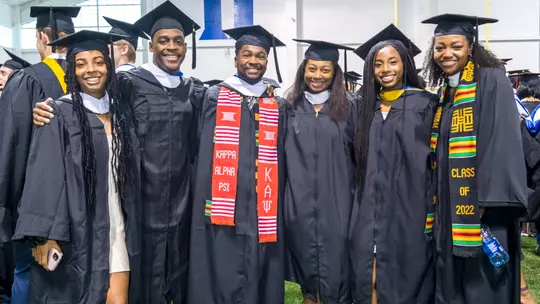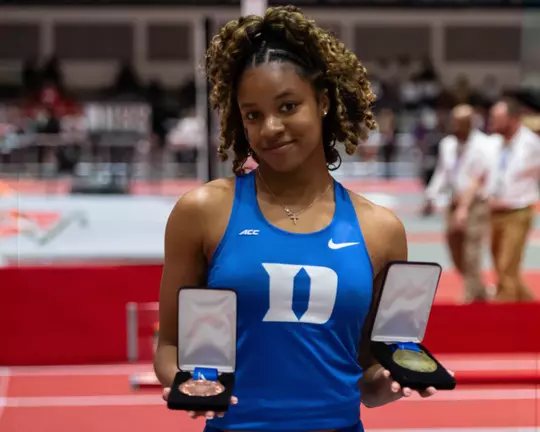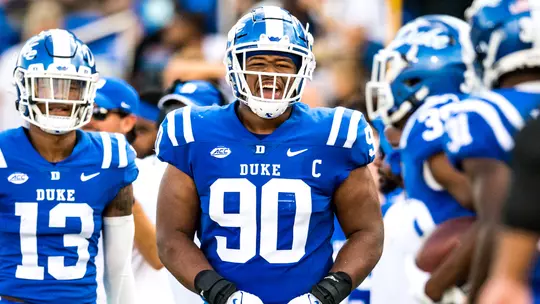
Duke's United Black Athletes Foster Community, Empowerment
In six years, this thriving organization has become a game-changer at Duke
Meredith Rieder, GoDuke The Magazine
When you walk into a room or any kind of space and immediately see others who look like you, a sense of comfort washes over you. There is a feeling of instant belonging that eases any trepidation you might carry about how to communicate or how you will be received in that moment.
For many of Duke’s Black student-athletes this is not the experience they have within their own athletics teams. Duke is a predominantly white institution, or a PWI as many often say, and most of the 27 varsity sports teams reflect the makeup of the general student body, leaving daily life for some Black athletes to be lonely and frustrating sometimes.
That’s where Duke’s United Black Athletes, or UBA, comes in. It may have taken 53 years from the time the first Black athlete stepped on campus for an organization of its kind to come about, but in a short six years the group is thriving.
“The reason I wanted to join UBA in the first place my freshman year was to stay connected with other Black athletes,” said women’s lacrosse sophomore Sydney Smith. “It can be tiring and kind of exhausting to not have people know what your experiences are and it’s obviously not their fault, but it’s just refreshing to have people around who share similar ideas or experiences or even beliefs.”
The first Black student-athlete at Duke was C.B. Claiborne in 1965, suiting up for the Blue Devils’ basketball team. The first football players – Clarence Newsome and Ernie Jackson – to receive athletics scholarships arrived on campus in 1968. Hundreds of Black athletes have since followed those trailblazers, but it wasn’t until 2018 when a few Black athletes came together to create UBA to help Duke’s Black athletes foster a community of their own while also giving them a voice within the overall Duke community.
Michelle Staggers, a member of the women’s lacrosse team from 2015-19 and one of the founders, felt a space was necessary for Duke’s Black athletes.
“I still struggle with identifying as an activist, because looking back at my experience and the creation of the group called United Black Athletes…we just needed a space,” said Staggers during a 2022 panel conversation alongside Claiborne for Black in Blue: The Duke Sports & Race Project. “I don’t know that we were thinking of big-scale activism. But it was more like ‘Black athletes need to meet each other, how can we make that happen?’”

Through hard work and perseverance from the first members, UBA became an officially recognized organization with a mission statement and constitution in December of 2018.
“Our mission is to provide a space for Black student-athletes to heal, uplift, and encourage one another through the challenges we face in athletics, academics, and campus life, as well as to generate a family-oriented support system on the foundation of common experience,” UBA’s first mission statement said. “Further, we envision a unified body that commits to serving the Duke and Durham communities through open, honest dialogue and service, using athletics as a vehicle to encourage a healthy lifestyle, social justice, hope, and unity.”
UBA has since done all of that and more for Duke’s Black student-athletes. For members such as current UBA president Brianna Smith and former UBA president Alexis Joseph, UBA is and was a vital part of their Duke experience.
“The work I was able to do with United Black Athletes and how I used my platform to advocate for Black Lives Matter and racial equity in lacrosse was far more important than the number of games I played in,” Joseph, who battled injuries throughout her Duke lacrosse career, recently wrote in a piece for Duke Uncut.
Brianna Smith, whose freshman year came during covid, says Joseph and UBA helped her navigate those challenging times. Not only did she have to attend class via Zoom, she also was living in a dorm with only her fellow track and field athletes, who for the first time in her life were predominantly white.
“That was the first time being on a team that was predominantly white, so that was a struggle for me trying to get used to that,” said Brianna. “I just was not used to having a team with very few people who looked like me and I was experiencing a lot of things on my team related to race that I was not used to experiencing in the context of track or sports. So, I think UBA really started for me as kind of a team outside of my team.”
Brianna found an outlet in Joseph and other members of UBA. She would go over to Joseph’s apartment to hang out and gradually she started seeing new faces from other sports teams. It wasn’t only about the support they provided, it also allowed her to develop friendships among the athletes that ultimately grew outward into the general Black Duke community.
“That was really fun for me,” Brianna said. “Even outside of the support in terms of being able to vent about stuff and have them understanding it, but also the friendship and having more people to hang out with. That simultaneously helped me reach out to the larger student Black community at Duke as well.”

There goes that word “community” again. United Black Athletes continues to be the perfect avenue for Blue Devils to grow their network, find mentors and friends. The organization allows them to build relationships with fellow students, athletes and non-athletes alike, as well as Duke staff members they may never have gotten the opportunity to interact with.
“UBA opened many doors and provided me with many new experiences that allowed me to grow,” said three-time Duke football captain DeWayne Carter. “From the various service projects to the community of friends, and the platform that it gave me were second to none. Through UBA I was able to build relationships with administrators who I probably would not have had the chance to if it weren’t for orgs like UBA that I was a part of during my time at Duke.”
Brianna, like Carter, is a natural leader. Encouraged by Joseph to join the executive board her sophomore year, the native of Elkins Park, Pa., started out running the social media accounts for the organization. She immediately saw the value in taking on a leadership role in the organization and a year later she became the president and turned her focus on making sure UBA has a legacy.
“I know it was already really hard for the founders of UBA to even start it,” said Brianna. “(At first) UBA maybe didn’t run as smoothly as some other student groups because honestly, we didn’t know anything. We didn’t know how to run a student organization. I’m really proud of myself and my exec board for how much progress we’ve made in this. We are just trying to lay the groundwork for UBA to have a legacy. I think once that is done, the sky is the limit for how much of an impact UBA can have.”
A part of creating a solid foundation for the future is making sure fresh faces and voices are involved and developed and UBA has done an incredible job of continuing to encourage Black athletes to get involved early in their Duke careers.
Duke women’s lacrosse sophomores Sydney Smith and Madison Beale hadn’t even become Blue Devils officially and they were aware of UBA. Now they both sit on the board as treasurer and secretary, respectively. While on their “official visit” Beale and Sydney both had the opportunity to meet UBA members through Joseph and they felt the draw to the organization instantly.
“Before I even got to Duke, I knew I wanted to be in it so as soon as we got on campus I went to the interest meeting,” said Beale. “I just knew I wanted to be involved in UBA in some way because of how important it was to me to interact with other Black athletes, especially being on a predominantly white team. It was just really important to me to be engaged with other Black athletes so I could keep a part of my culture alive in a way just because I’m always surrounded by my white counterparts.”
Sydney, who like Beale wanted to form bonds with fellow Black athletes, has found UBA helpful in maintaining a healthy balance within her life.
“I think it’s also just a huge benefit to my mental health in a way because you are around people who have similar experiences,” said Sydney. “We share a lot of similar experiences at Duke especially and being able to talk that through is something really special and kind of healing in a way. Also, yes, Duke is a PWI but there are obviously a lot more Black people on this campus (who aren’t athletes) so it’s nice to get to know the greater community.”
While UBA is a space for Black athletes to come together and share and discuss their experiences — both good and bad — it’s also an opportunity to engage with their fellow athletes on a very human level and have fun. They have a wide array of events from game nights to football tailgates or an event focused on setting goals. Coming up in March they are hosting another faculty mixer to build connections with Duke professors.
“With people who are on teams that are majority Black or have more Black people, they don’t always feel that need to reach out for that extra team outside their team,” Brianna Smith said. “But I think at the end of the day there is so much value in making those connections outside of your team. It can be a less serious reason. It can be ‘I want to have fun, I want to meet people.’ It can provide a lot even if it’s not something you feel you need.”
Carter echoes Smith’s encouragement to Black athletes who aren’t involved in Duke’s United Black Athletes. He and Smith implore their fellow Blue Devils to get out of their team bubbles and comfort zones and to always continue trying something new, regardless of what it might be.

“They’re missing out (if they’re not involved in UBA),” Carter said. “They need to branch out away from their teams and see all that UBA has to offer. And even if it’s not UBA, I would still encourage them to branch out and explore Duke as a whole and get involved. Whether that’s going to one event or joining a new club, no matter what it is, try something new. You never know the lasting impact that it may leave on your life.”
During the conversation between Staggers and Claiborne, she spoke about how UBA can influence Duke’s Black athletes now and in their professional lives. Beale, Brianna Smith and Sydney Smith already see the impact it has had on them. They envision themselves utilizing the knowledge and skills they’ve garnered from UBA leaders and mentors of how to make change as they pursue equity through their future careers — health care for Beale, psychology for Sydney and translational science for Brianna.
“That’s just one thing we tried to create — to have a space for Black athletes to come together and build a community and push social justice issues,” Staggers said about UBA during the panel for Black in Blue. “It can look like anything. I just want Black athletes at Duke to know they have the support and mechanisms at this institution to really do some amazing work and push the school forward.”
Those words from Staggers ring true two years later because they are doing amazing work.
This story originally appeared in the 15.7 issue of GoDuke The Magazine – February 2024. Dedicated to sharing the stories of Duke student-athletes, present and past, GoDuke The Magazine is published for Duke Athletics by LEARFIELD with editorial offices at 3100 Tower Blvd., Suite 404, Durham, NC 27707. To subscribe, join the Iron Dukes or call (336) 831-0767.
